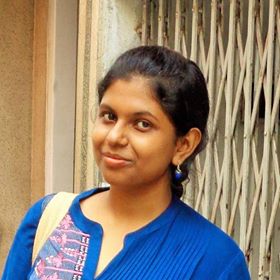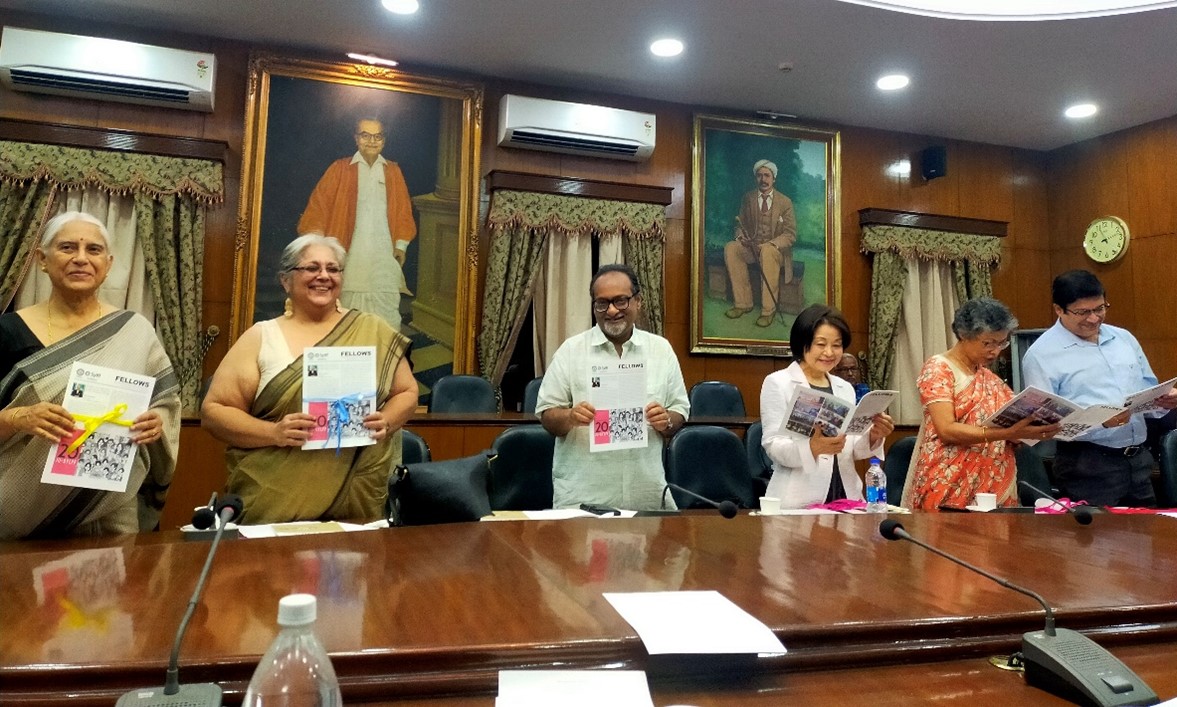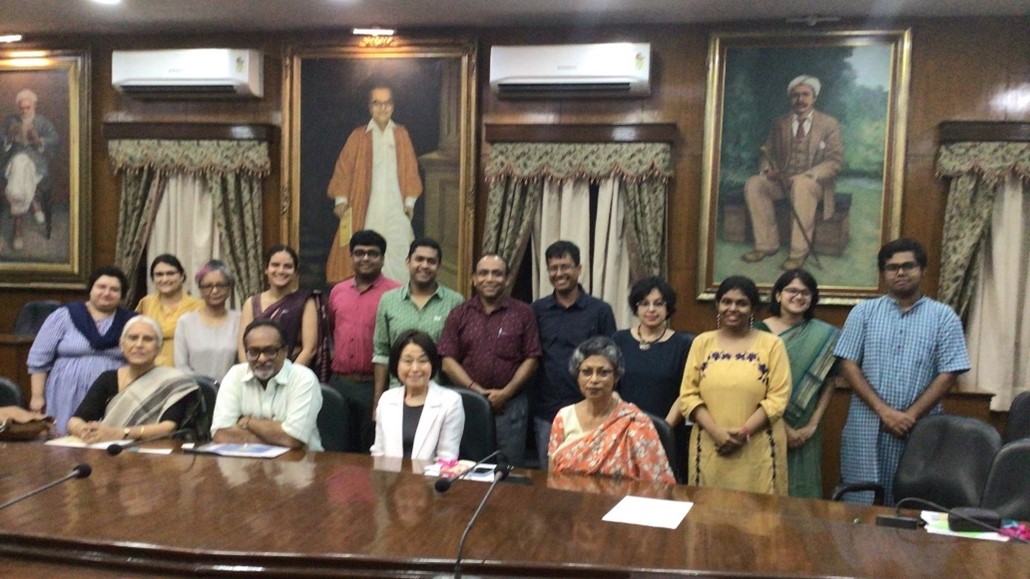Voices from the Sylff Community
Oct 23, 2023
Celebrating Sylff’s Twentieth Anniversary at Jadavpur University
The much-anticipated return of in-person gatherings in the Sylff community was spearheaded by Jadavpur University, which hosted a COVID-delayed LANS meeting in March 2023 to commemorate JU-SYLFF’s twentieth anniversary. Sritama Chatterjee (Jadavpur University, 2017) reports on the gathering of Sylff alumni, who explored key questions confronting scholars in the humanities and social sciences.
* * *
How do we reimagine our scholarship and engagement with the public in the aftermath of the COVID pandemic? This key question was at the heart of the Local Association Networking Support (LANS) meeting organized by Jadavpur University on March 28, 2023. This was the third time that JU organized a LANS gathering to promote the spirit of collaboration, exchange, and community among Jadavpur fellows, who have become leaders in their respective fields around the world. The LANS meet offered a space for the fellows to rekindle intellectual networks, though the fellows have always made efforts despite the pandemic to stay in touch with one another. The occasion also marked the twentieth anniversary of Sylff at JU. We were honored to be joined by Mari Suzuki, executive director of the Tokyo Foundation for Policy Research, on the occasion and for the Foundation’s continued support toward our work.
The presence of the JU-SYLFF executive committee at the meeting was also noteworthy. Each committee member, including our assistant pro-vice-chancellor and finance officer, offered encouraging words and pledged continuous administrative support for the work of the JU-SYLFF community. The LANS meeting began with Professor Shibashis Chatterjee, director of JU-SYLFF, welcoming Executive Director Suzuki, the fellows, and members of the executive committee to the meeting, followed by remarks from Professor Joyashree Roy, founder-advisor of JU-SYLFF, who recounted the history of how Sylff came to Jadavpur University in 2003. Faculty mentors present at the meeting—Professor Emerita Supriya Chaudhuri and Professor Kavita Panjabi—recounted how fellows over the years have gone on to make their presence felt in their distinctive ways.
As scholars in the humanities and social sciences, how we remember and document our institutional histories matter. To that end, we published the newsletter celebrating 20 years of Sylff at JU that carried articles and artwork of the members of JU-SYLFF community. The newsletter that I and other fellows—Moitrayee Sengupta, Sujaan Mukherjee, and Soumya Bhowmick—conceptualized and edited was the culmination of months of labor: writing a call for papers and multiple emails, reaching out to members of the community, writing an editorial, proofreading, copy-editing, and designing. Our hope is that the newsletter will serve to document the multiple interests and work that the JU-SYLFF community has done over the years and note the shifts and transformations.
The meeting followed a unique format featuring three roundtables focused on the themes of justice, governance, and public humanities. Questions developed by our faculty mentors and focused on these themes were shared with the fellows participating in the roundtable in advance so that the conversation could be streamlined and nuanced.
The first roundtable on justice was chaired by Professor Kavita Panjabi, and Sylff fellows Sreerupa Bhattacharya, Renee Lulam, and Sritama Chatterjee participated to consider the utility, limits, and potential of various modes of justice. Questions for this roundtable included: (a) Do you think restorative justice, which focuses on repairing the harm caused by the crime, can be a practical and effective alternative in contemporary times to retributive justice, which focuses on punishing an offence? Explain how or why not. (b) Do you think linguistic justice runs the risk of becoming a tokenism, whereby diversity accepted and even celebrated at the linguistic level may leave untouched a deep disdain for minorities and may even result in increased oppression in everyday life? To contextualize the roundtable, Professor Panjabi put forward various definitions of justice, such as restorative, reparative, and retributive, and referred to several Greek tragedies. In response to the questions posed, participants in the roundtable reflected on questions of accountability, the limits of the legal system, the #MeToo movement, and feminist ethics of justice.
The second roundtable focused on governance and was chaired by Professor Shibashish Chatterjee. Sylff fellows Sulagna Maitra, who travelled all the way from Dublin, and Sreya Mita were the participants for this roundtable. Questions addressed included: (a) How do we characterize the existing modes of governance in contemporary times? What are its normative goals? Your reflections on how modern capitalism and administration function would be very helpful. (b) How do we understand global governance and its challenges in the contemporary world order? What are the major issues involved? Is there a crisis of global governance at present? (c) Is governance a matter of justice or efficiency? What do existing practices suggest? Drawing on her expertise in humanitarian action, Sulagna Maitra reflected on the utility and limits of such action in the current geopolitical climate, while Sreya Mitra articulated her discomfort about the term “governance” itself: governance for what and for whom?
The conversations about equity and justice paved the way for the roundtable on public humanities and the value of the humanities in today’s world at a time of increasing anti-intellectualism. Chaired by Professor Emerita Supriya Chaudhuri, the roundtable saw Sujaan Mukherjee, Shubhasree Bhattacharyya, Sebanti Chatterjee, and Nikhilesh Bhattacharya speaking about the need for a more expansive understanding of what the humanities can bring to archival spaces, classrooms, and museum settings. The questions posed to the participants included: (a) One of the major concerns of public humanities is whether a humanities education itself can survive in an increasingly corporatized and managerial higher education system. What, in your opinion, is the role of the humanities today? (b) Should public humanities engage with the moral economy of well-being, debating questions of equality, access, freedom, and the need to formulate a concept of social justice? (c) How can public humanities go beyond narrowly human interests in order to address planetary concerns, such as inter-species relations, biopolitics, and environmental risk? In response to the questions about higher education, Shubhasree Bhattacharya reflected on a question that she was once asked, “What do you produce in the humanities?” While it prompted momentary laughter among all, it was a good reminder to escape falling into the vicious cycle of neoliberal models of academic productivity often demanded of scholars in the humanities and instead focus on work that will benefit communities and students, as stressed by both Mukherjee and Bhattacharya.
The LANS meet ended with a writing segment where participants reflected on their takeaways from the meet and with a group photo. As a JU-SYLFF fellow, I hope that the 2023 meeting will pave the way for more dynamic exchange and collaboration among fellows in the future.


